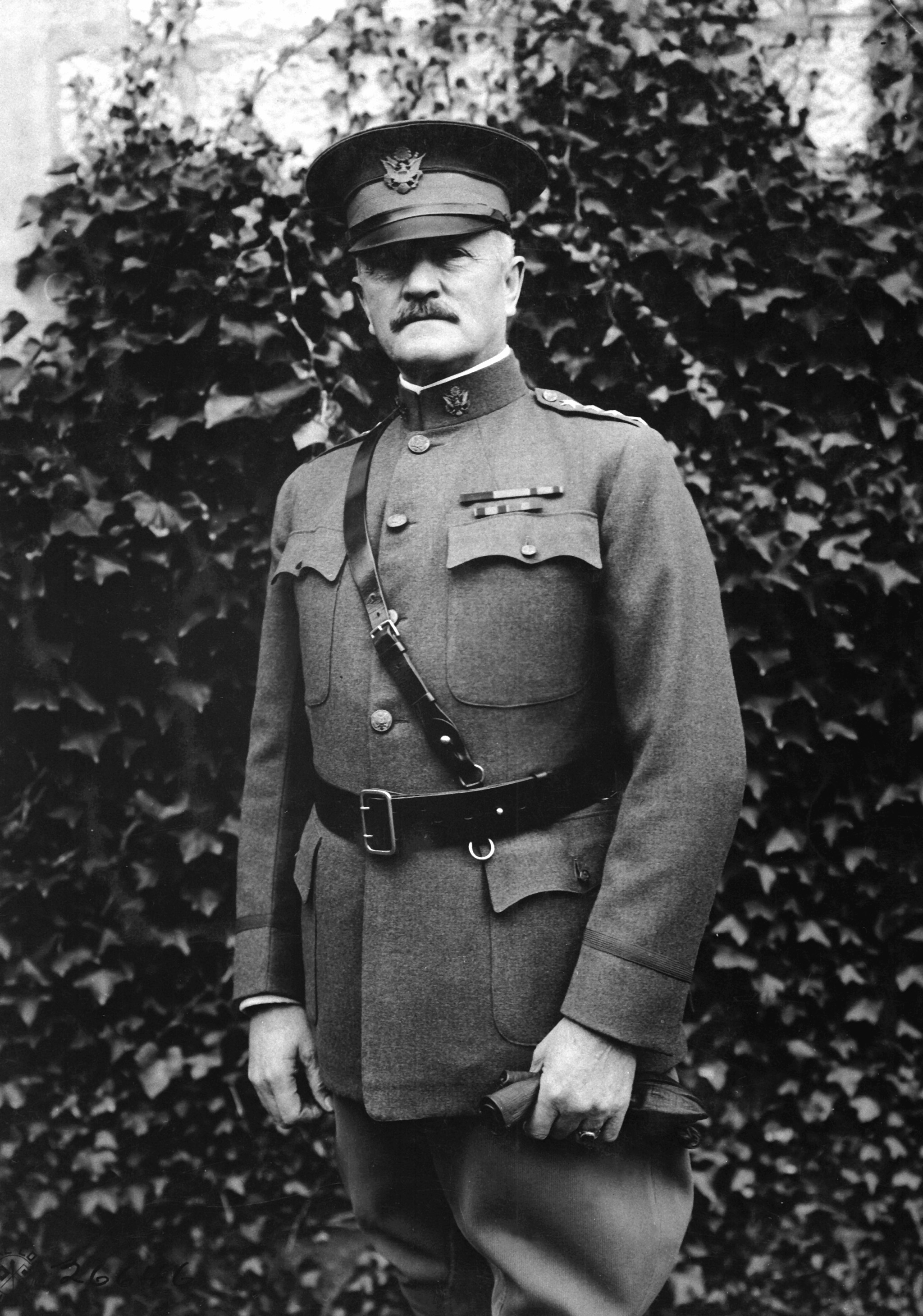John Joseph "Black Jack" Pershing (September 13, 1860 – July 15, 1948) was the United States Army general who led the American Expeditionary Forces in World War I. Owing to a request from General Pershing, Grant wrote his mother a very interesting and descriptive letter just a few days after he'd last written her.
Sunday – May 12, 1918
Dear Mother:-
 |
| John J. Pershing (1860-1948) |
One year ago today Dot and I were pacing the Board Walk at Atlantic City, N.J. About this time (10 A.M.) I had bought her a bouquet of lily-of-the-valley and I myself was wearing a white carnation. Those were surely happy days. After our promenade we sat down to a table with white table cloth and napkins and ate a delicious chicken dinner. Will those good times ever return? Yes, surely they will. Even better days are in store for us all after this long period of privations has terminated.
It’s a typical American May day direct from Minnesota today. The sky is cloudy and threatening. The river is swelled with recent rains. The hills are a brilliant green with very heavy foliage. This is the most beautiful post of any on the two fronts we are covering. These are seven of us up here at present-–three of our cars and one French ambulance which takes care of the French wounded in this sector. We are now driving with our own aides so we are a very happy party indeed.
We are living in a two-room, corrugated steel abri well protected with logs and stones. The back room is our sleeping room where the seven of us sleep on stretchers arranged on racks of two layers. (I have an upper.) The front room is our sitting room, dining room, kitchen and library. It is now being used for all purposes at once. Hap and I are writing on the tables. Titchener (son of the famous psychologist) is reading; Woodie is munching crackers; the Frenchman (a very nice young fellow who has been several times wounded so that it is necessary for him to be in some non-combatant branch of the service) is preparing our noon meal on a stove which some ingenious hand has made from a gasoline “bidon” [gas can]. Judging from the smell I should say that he is preparing a tasty “slum-guillion” with onions in it. The other two boys are off on a call. McCrackin, “the Montana banker” (Hamilton, Montana) is driving the car with Bert (ex-instructor of French in eastern public schools) as his aide.
As I sit here writing I can look out over a beautiful valley in the middle of which sits a chateau enclosed with an eight foot stone wall now pierced with many shell holes. On the hillside across the valley is a quarry where men in uniform work all day long extracting the soft stone for road building. Today, being Sunday, everything is quiet except the wind which toils on continuously, never resting. One would little suspect that these roads and valleys are a veritable nest of batteries but so it proved when, last week, there was “something doing” up here. The French are very clever at hiding their positions. I was driving along a piece of road the other day over which I had driven many times before, never suspecting that there was such a thing as a gun in the vicinity. Bang! Bang! Bang! Went a battery of “heavies” right beside me. My “Henry” didn’t like it very well and tried to shin a tree. After enticing it back into the road I tried to locate the battery but I couldn’t see a sign of it. It was two days later, after the positions had been changed, that I discovered they had been within 20 yards of the road. This just goes to show how cleverly the Frenchmen had done their work. I wish they would blow a whistle or something to warn the ignorant ambulance driver. They’d like to scare the liver out of a man.
Last week we had considerable work to do in this sector and for 48 hours none of us had a chance to sleep but it has again quieted down. We have been up here today since 8 o’clock this morning and have had but one call.
Since last writing you I have received several letters and packages. Your letter of April 3 from Long Beach, Tib’s of the same date, Dad’s mailed Apr. 8 enclosing Liberty Loan “dope,” a card from the Sperrys, a couple from Dot. Also a sweater, socks, air-pillow, photographs, a book and a comfort kit from Dot. Two Literary Digests also arrived. All were very welcome. The packages Dot sent over by Agnes Nicholson and were mailed to me from Paris.
 |
| Louise R. Willard (1867-1940) |
The only thing I can think of now that I want next to a declaration of peace is some paper for a No. 509 loose-leaf I-P notebook. I enclose a sample of the kind I would like. I asked for this once before but I guess you never got the letter.
With much love to all,
Grant.

No comments:
Post a Comment